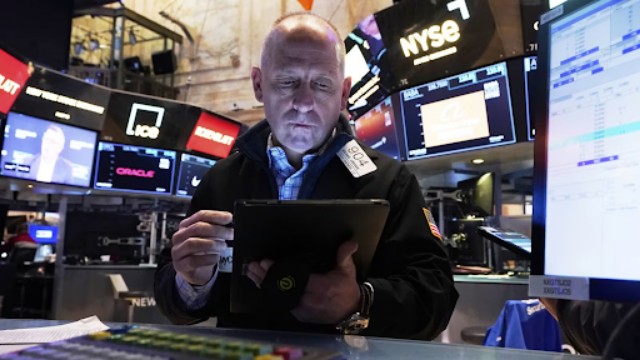
Michael Urkonis, a trader, is seen working on the floor of the New York Stock Exchange on Thursday, April 17, 2025. (Photo by Richard Drew/AP)
As Big Tech companies prepare to release their quarterly earnings, they're grappling with political uncertainty that has sent shockwaves through the market. Nearly 100 days into Donald Trump's second term, his policies have already shaken the very foundations of these tech powerhouses.
Since Trump took office on January 20, tech stocks have been on a rocky path. The "Magnificent Seven" — Apple, Microsoft, Nvidia, Amazon, Tesla, Alphabet (Google's parent), and Meta (Facebook's parent) — have collectively lost a staggering $3.8 trillion in market value, a 22% drop. Hopes were high when industry leaders like Tim Cook, Elon Musk, Sundar Pichai, Mark Zuckerberg, and Jeff Bezos publicly backed Trump during his inauguration. They anticipated fewer regulations and fresh opportunities in AI and global expansion.
But reality has been starkly different.
Trump's surprise rollout of sweeping tariffs, especially targeting supply chains in China, dealt a heavy blow to the sector. While a temporary pause on the harshest tariffs — including exemptions for electronics — has slightly eased the pressure, it's clear this breather might not last. Trump has warned that more trade penalties may follow.
These looming threats have rattled the tech industry, which heavily depends on global manufacturing and distribution. Companies are now struggling to forecast supply chain needs, manage inventory, and plan for future demand in an increasingly unpredictable environment.
Dan Ives, a tech analyst at Wedbush Securities, described the atmosphere as “mass confusion,” saying the ever-changing headlines out of the White House are creating chaos for both companies and investors.
And it’s not just tariffs causing turmoil.
The Trump administration is aggressively pushing forward with antitrust battles started during the Biden era. Meta is facing scrutiny for allegedly maintaining a monopoly on social networking. Google is under fire for using its search engine power unfairly, with federal efforts underway to split the company. Apple and Amazon are also still caught in the legal crosshairs, with no signs that Trump intends to let up.
Meanwhile, Nvidia suffered a major blow when it was barred from selling a top-performing AI chip to China. The move forced Nvidia to write off $5.5 billion in inventory, a serious hit as the company readied for the next earnings announcement.
This week kicks off a busy financial reporting season. Tesla goes first on Tuesday, having already disclosed a 13% year-over-year drop in car sales. The dip came as protests and public backlash grew over Elon Musk’s visible role in the Trump administration, especially around recent budget cuts.
Alphabet will reveal its results on Thursday, followed by Amazon on April 29, Meta and Microsoft on April 30, and Apple on May 1. Nvidia, which follows a different fiscal year, will wrap up earnings season on May 28.
These conference calls will offer CEOs a platform to explain how they plan to navigate rising trade tensions, antitrust pressures, and unpredictable politics. Investors and the public alike will be watching closely.















